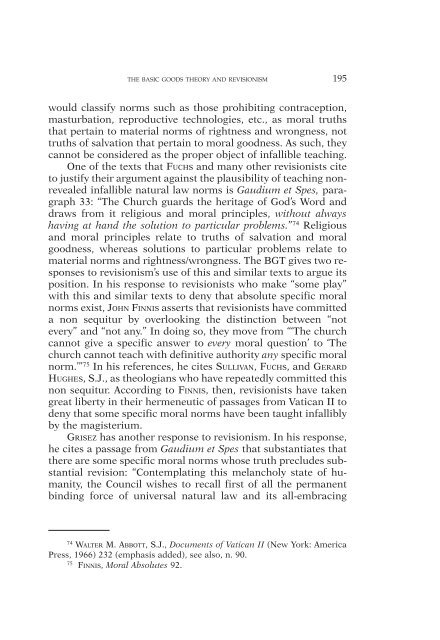Avant-propos - Studia Moralia
Avant-propos - Studia Moralia
Avant-propos - Studia Moralia
Create successful ePaper yourself
Turn your PDF publications into a flip-book with our unique Google optimized e-Paper software.
THE BASIC GOODS THEORY AND REVISIONISM 195<br />
would classify norms such as those prohibiting contraception,<br />
masturbation, reproductive technologies, etc., as moral truths<br />
that pertain to material norms of rightness and wrongness, not<br />
truths of salvation that pertain to moral goodness. As such, they<br />
cannot be considered as the proper object of infallible teaching.<br />
One of the texts that FUCHS and many other revisionists cite<br />
to justify their argument against the plausibility of teaching nonrevealed<br />
infallible natural law norms is Gaudium et Spes, paragraph<br />
33: “The Church guards the heritage of God’s Word and<br />
draws from it religious and moral principles, without always<br />
having at hand the solution to particular problems.” 74 Religious<br />
and moral principles relate to truths of salvation and moral<br />
goodness, whereas solutions to particular problems relate to<br />
material norms and rightness/wrongness. The BGT gives two responses<br />
to revisionism’s use of this and similar texts to argue its<br />
position. In his response to revisionists who make “some play”<br />
with this and similar texts to deny that absolute specific moral<br />
norms exist, JOHN FINNIS asserts that revisionists have committed<br />
a non sequitur by overlooking the distinction between “not<br />
every” and “not any.” In doing so, they move from “‘The church<br />
cannot give a specific answer to every moral question’ to ‘The<br />
church cannot teach with definitive authority any specific moral<br />
norm.’” 75 In his references, he cites SULLIVAN, FUCHS, and GERARD<br />
HUGHES, S.J., as theologians who have repeatedly committed this<br />
non sequitur. According to FINNIS, then, revisionists have taken<br />
great liberty in their hermeneutic of passages from Vatican II to<br />
deny that some specific moral norms have been taught infallibly<br />
by the magisterium.<br />
GRISEZ has another response to revisionism. In his response,<br />
he cites a passage from Gaudium et Spes that substantiates that<br />
there are some specific moral norms whose truth precludes substantial<br />
revision: “Contemplating this melancholy state of humanity,<br />
the Council wishes to recall first of all the permanent<br />
binding force of universal natural law and its all-embracing<br />
74 WALTER M. ABBOTT, S.J., Documents of Vatican II (New York: America<br />
Press, 1966) 232 (emphasis added), see also, n. 90.<br />
75 FINNIS, Moral Absolutes 92.

















